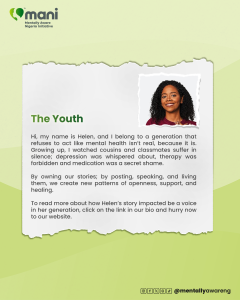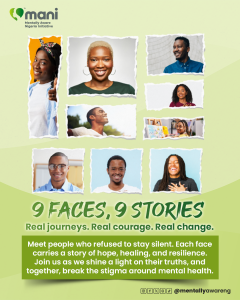
I’m Helen, and I belong to a generation that refuses to act like mental health isn’t real, because it is! Growing up, I watched cousins and classmates suffer in silence; depression was whispered about, therapy was forbidden and medication was a secret shame. But the moment I came across MANI’s posts, the awareness they create in schools, and communities, and the post about the right words to use when discussing some topic, I realized something: talking about my thoughts does not make me weak, it makes me human. I decided right then that I wouldn’t let old stigmas go unchallenged.
At my university, I started an Instagram page. Initially, I posted simple reels: “Here’s what my first therapy session felt like,” “Five things I wish I knew before starting medication,” and “Quick mindfulness breaks between lectures.” The comments started pouring in, classmates tagging friends who needed to see it, others sending direct messages to say, “I’m scared too.” Before long, a small campus community formed: we held weekly check-ins where anyone could join anonymously and share how they were really doing. We hosted “Seeking Help 101” with mental health professionals and advocates, partnered with the counselling unit to distribute flyers about counselling and how to get help
But social media wasn’t enough. My friends and I organized “Mental Health Street Chats” on weekends, pop-up events in the student centre sports centre where people could grab a free drink and chat with mental health advocates (we even had a “Chill Corner” with beanbags and stress balls). We collected artefacts of stigma, old magazines with “crazy” headlines, and memes that painted places like “Federal Neuropsychiatric Hospital, Aro”, and “Federal Neuropsychiatric Hospital, Yaba” as places for “mad people” and used them to create an art installation called “Shards of Silence.” Once students walked through it, they couldn’t ignore how harmful those messages were. Each piece of art was accompanied by resources: helplines, therapy directories, peer-support groups etc. Today, the narrative on my campus has shifted. Study groups start with a quick “mental check” asking, “How are you, really?”
My generation is refusing to let silence be our legacy. We are demonstrating that asking for help is as normal as studying for exams or supporting our sports teams. By owning our stories; by posting, speaking, and living them, we create new patterns of openness, support, and healing. We’re not just breaking cycles; we’re building a world where saying “I need help” is the first step to showing “I’m worth it.” Because mental health is health, period.

